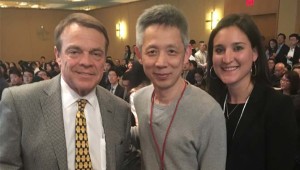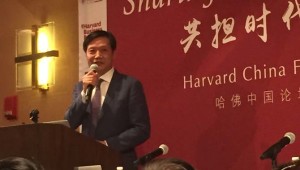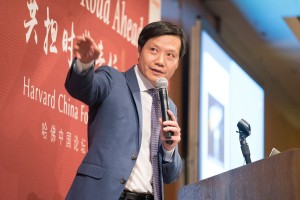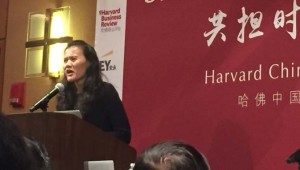(Caption: Alexandra Tirado (far right) with Jiang Changjian, TV host and producer of China’s hit show “The Brain”, and Chairman and CEO of CEA Fresh Farms, Kevan Fight. Photo Courtesy: Alexandra Tirado)
If Steve Jobs, pre-politics Donald Trump, Jeff Bezos and Jamie Dimon were all in a room together, it may be a shy resemblance of the Harvard China Forum. On April 21-23, China’s greatest innovators, talents, and leaders across industry sectors joined together to discuss technological innovation and entrepreneurship in China.
Pan Shiyi (China’s real estate tycoon), Lei Jun (Xiaomi’s CEO), Peng Lei (co-founder of Alibaba), and Kenny Lam (Noah Holding’s President) were among the A-listers in attendance.
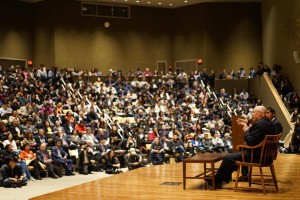
(Caption: Fred Hu Founder and Chairman of Primavera Capital) and Hank Paulson (former Secretary of the Treasury) keynote address to a packed auditorium. Photo Courtesy: Zara Zhang)
Over 1,000 students and professionals came out to participate in the three-day conference, in which China’s business stars took the stage to give personal testimonies of their company’s rise to power. It was a marathon event that took stamina to keep up with the packed schedule of heavy hitters and speeches that even brought out the likes of Mark Cuban and Arianna Huffington. Pure excitement, thirst for knowledge and recognition that this was truly a once in a lifetime event kept me in my seat, acutely focused from nine in the morning until late into the nighttime hours.
As with many facets of US-China relations, there are many stereotypes that exist regarding both sides. This particular event helped to dispel a myth that China lacks innovation. While there is no denying that there have been major intellectual property breaches in the past, it would be naïve for us to continue to believe that China lacks imagination and creativity. Some of the world’s most powerful and efficient platforms such as WeChat have been born out of China, with a keen understanding that social media, mobile technology, and commerce can be integrated into an all-encompassing super app. Has the time come for the US to recognize China’s ingenuity and facilitate greater technology transfer from China to the US? I, for one, think so.
(Caption: Xiaomi’s Founder and CEO, Lei Jun, details the rise of the the world’s 5th largest smartphone maker. Photo Courtesy: Alexandra Tirado, Zara Zhang)
Moreover, what is most striking is that the age of Chinese entrepreneurship has really just begun to unfold. As China moves rapidly towards the service sector, the youth are also opening themselves up to new ideas regarding what a typical career path looks like. Take Dai Wei, for example, the founder of Ofo, a social bike sharing business. As a Peking University graduate with a promising career ahead of him, it was certainly extraordinary to create a social bike company from scratch. How did an initial funding of $20,000 turn into a unicorn? He certainly broke from traditional society’s education and career expectations, and for that, many are taking note and following suit.
As many more Chinese seek ventures rather than vacation days and 9-5’s, tech stars have earned a hero status and cult-like following. To reach such heights as these stars have done in a country of one billion plus, while also facing certain political and economic risks, one certainly has to possess superhuman like qualities of perseverance, resourcefulness, and intellect. So, it struck me as odd that the vast majority of attendees at this event were Chinese. To me, there is much the non-Chinese community can learn from China’s version of Steve Jobs and Jeff Bezos. If they can make it in the world’s most competitive and cutthroat market, shouldn’t we take stock of what they know that we should?
(Caption: Alibaba’s co-founder, Peng Lei, sets the vision for China’s e-commerce giant. Photo Courtesy: Alexandra Tirado )
Perhaps it was the language barrier that kept non-Chinese speakers away (although there were great translators). Whatever it may have been, I do believe that the entrepreneurial journey is on many levels a universal language and culture, in which we all share ups and downs, steep challenges and hopefully bountiful rewards. Perhaps it is in this sector that we can most find the most in common. Entrepreneurship gives us a foundation and a platform to bond in our ambition to create something beyond ourselves despite the many rejections and risks. It is on this journey that perhaps we set aside or ignore our language barriers, cultural differences to focus on what truly matters – and the pursuit of turning a dream into a reality.
I look forward to next year’s Harvard China Forum and the coming together of diverse minds but speaking the same entrepreneur’s language of imagination, innovation, and improvement of our lives in America and in China.



